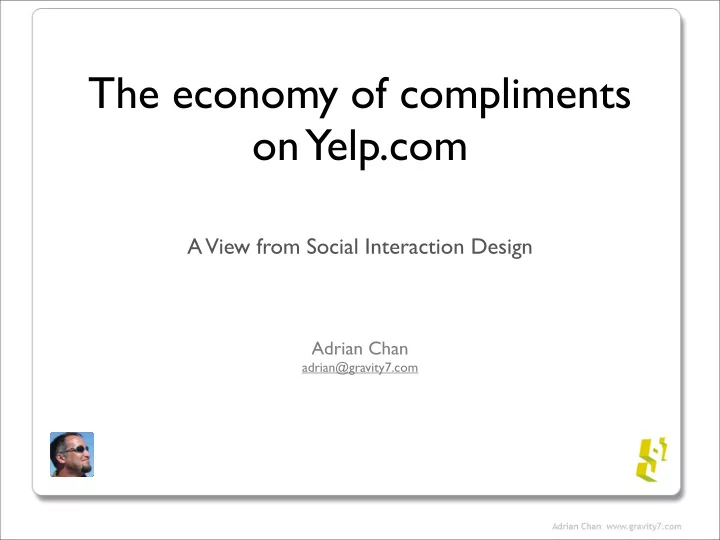

The economy of compliments on Yelp.com A View from Social Interaction Design Adrian Chan adrian@gravity7.com by Adrian Chan, 2007
We look simply to see, see others looking, see we are seen looking, and soon become knowing and skilled in regard to the evidential uses made of the appearance of looking.” Erving Goffman, Forms of Talk by Adrian Chan, 2007
Yelp.com by Adrian Chan, 2007
Yelp.com • Yelp is “real reviews, real people” • Using “consumer generated reviews,” Yelp also • generates traffic to reviews through people • and traffic to people through reviews • Reviews build a profile for the user so that users can engage with reviews or with each other by Adrian Chan, 2007
Yelp.com • To facilitate conversation on Yelp, the site offers a set of compliments: by Adrian Chan, 2007
Yelp.com • Users give each other compliments • directed either at the person • at their reviews • at their style • at their looks, etc • And because communication solicits response, a compliment given is often a compliment returned by Adrian Chan, 2007
...this place looks cool by Adrian Chan, 2007
by Adrian Chan, 2007
she’s hot! by Adrian Chan, 2007
and she’s cool too! by Adrian Chan, 2007
by Adrian Chan, 2007
I’ll tell her... by Adrian Chan, 2007
I’ll tell her... by Adrian Chan, 2007
by Adrian Chan, 2007
hey, look what I got! by Adrian Chan, 2007
hmm, he’s cool by Adrian Chan, 2007
by Adrian Chan, 2007
by Adrian Chan, 2007
by Adrian Chan, 2007
hey! back at me! by Adrian Chan, 2007
Now they’re both happy by Adrian Chan, 2007
And everyone can see it by Adrian Chan, 2007
this works! by Adrian Chan, 2007
this works! by Adrian Chan, 2007
this works! by Adrian Chan, 2007
this works! by Adrian Chan, 2007
this works! by Adrian Chan, 2007
by Adrian Chan, 2007
by Adrian Chan, 2007
by Adrian Chan, 2007
by Adrian Chan, 2007
browse, click, browse... by Adrian Chan, 2007
browse, click, browse... by Adrian Chan, 2007
browse, click, browse... by Adrian Chan, 2007
browse, click, browse... by Adrian Chan, 2007
browse, click, browse... by Adrian Chan, 2007
browse, click, browse... by Adrian Chan, 2007
browse, click, browse... by Adrian Chan, 2007
browse, click, browse... by Adrian Chan, 2007
browse, click, browse... by Adrian Chan, 2007
browse, click, browse... by Adrian Chan, 2007
browse, click, browse... by Adrian Chan, 2007
browse, click, browse... by Adrian Chan, 2007
traffic! by Adrian Chan, 2007
traffic! by Adrian Chan, 2007
traffic! by Adrian Chan, 2007
traffic! by Adrian Chan, 2007
traffic! by Adrian Chan, 2007
Yelp.com by Adrian Chan, 2007
Yelp.com • being friendly pays off • people are the content • compliments are a perfect ice breaker • and though we give them to each other, they’re given in public • they add to our credibility and popularity • and make the site more active • which adds up to traffic and participation! • however.... by Adrian Chan, 2007
Yelp.com • With its economy of reciprocity around the exchange of compliments • Many of Yelp’s users are motivated to review more and to interact more • With the result that Yelp reviews are often biographical, subjective, and story-like • Thus giving users personality through reviews that serve as their profiles by Adrian Chan, 2007
Yelp.com • Yelp is an example of how review sites can become profile-based sites, and of how easily subjective user reviews (brands, businesses, and services) can be overtaken by members interested in their own rank and in each other • By structuring compliments, Yelp can improve its data on members and on businesses • And helps users be more precise — even when they would rather not be! • Gestural languages like those on Yelp will continue to develop in order to distinguish communication between users, communication about users, and communication about content by Adrian Chan, 2007
“By an extension of meaning, ‘stroking’ may be employed colloquially to denote any act implying recognition of another’s presence. Hence a stroke may be used as the fundamental unit of social action. An exchange of strokes constitutes a transaction, which is the unit of social intercourse.” Eric Berne, Games People Play by Adrian Chan, 2007
Recommend
More recommend